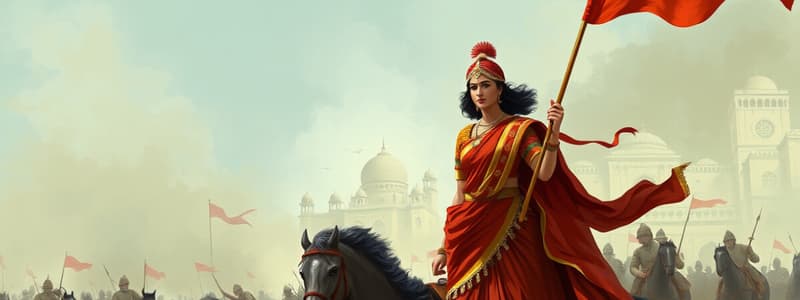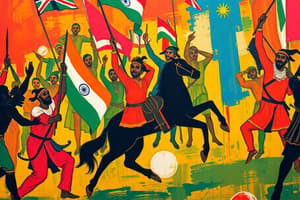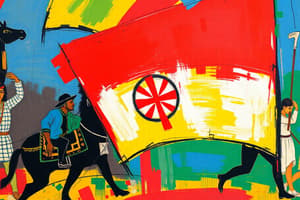Podcast
Questions and Answers
What significant event took place at the Lucknow Residency involving the British army?
What significant event took place at the Lucknow Residency involving the British army?
The British army failed to fight back the revolutionaries and took refuge in the Lucknow Residency, which was set on fire, resulting in the death of British Resident Henry Lawrence.
Who was Rani Lakshmibai and what motivated her to support the revolt?
Who was Rani Lakshmibai and what motivated her to support the revolt?
Rani Lakshmibai of Jhansi was a prominent leader of the revolt motivated by the annexation of her territory by the British.
Describe the British response to the revolt after their initial setbacks.
Describe the British response to the revolt after their initial setbacks.
The British response was swift and brutal, involving the mobilization of forces that burnt villages, massacred villagers, and hanged thousands of people publicly.
What was the fate of Bahadur Shah II after the British recaptured Delhi?
What was the fate of Bahadur Shah II after the British recaptured Delhi?
What happened to Jhansi and Gwalior during the course of the revolt?
What happened to Jhansi and Gwalior during the course of the revolt?
Flashcards are hidden until you start studying
Study Notes
British Army and the Lucknow Residency
- British forces retreated to the Lucknow Residency building during the uprising.
- The building was set ablaze by revolutionaries, leading to the death of British Resident Henry Lawrence.
- Emergency assistance from British officers resulted in further casualties among them.
Key Figures in the Revolt
- Rani Lakshmibai of Jhansi emerged as a prominent leader of the revolt.
- Her support for the rebels was driven by the annexation of her territory by the British.
British Response to the Revolt
- Initially faced setbacks, the British swiftly organized a brutal military response.
- Under Governor-General's orders, British forces employed a scorched earth policy, burning villages and executing thousands.
- Public executions were common as a means to suppress the rebellion.
Significant Events and Outcomes
- Delhi was recaptured by British troops in September 1857.
- Bahadur Shah II, the last Mughal emperor, was captured and tried for rebellion.
- He was found guilty, exiled to Rangoon, and died in 1862; witnessed the execution of his two sons.
Key Territorial Recoveries
- Jhansi was recaptured by British forces in April 1858.
- Gwalior was also taken back by the British in June 1858.
- Rani Lakshmibai died while valiantly resisting British forces in battle.
Studying That Suits You
Use AI to generate personalized quizzes and flashcards to suit your learning preferences.




